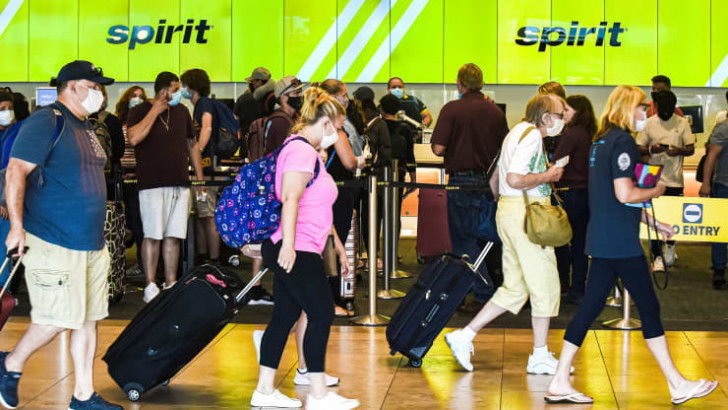America
Spirit and Frontier are combining to form a big low-cost carrier

Over the last decade, Spirit Airlines and Frontier Airlines have rapidly expanded, providing travellers no-frills service in exchange for dirt-cheap flights.
Even if the carriers finalise their $6.6 billion merger, which would convert them into a bargain behemoth and the country's fifth-largest airline, their CEOs promise to keep it that way. Frontier will own a majority share in the company.
In an interview, Frontier CEO Barry Biffle noted, "Our business strategy is focused on low rates - that promotes travel." "We're planning to lower the fares much further."
Obstacles to competition :
The ability of the merged airlines to keep fares low will be critical to regulators' approval of the merger. Last year, President Joe Biden made increasing competition a priority. His Justice Department has already filed a lawsuit against American Airlines and JetBlue Airways in the Northeast, arguing that their combination decreases competition and raises prices.
The airlines have rejected this, claiming that the alliance was formed to help them compete more effectively with United Airlines and Delta Air Lines in congested airports in the New York region and Boston.
The Frontier-Spirit merger would give other carriers a stronger rival, but it would also leave travellers with less options.
"We think the deal's merits - everyone benefits," Biffle said. "We believe we will receive a warm welcome because the administration has been seeking for methods to increase competition, and we believe this is the solution."
Nothing will change for customers until those critical clearances are obtained. The transaction is expected to finalise in the second part of the year, according to the airlines. They haven't settled on a new name or location for the company. It might take years to integrate an airline.
Despite the fact that they both fly narrow-body Airbus aeroplanes, officials haven't stated whether they'll replace their distinctive Airbus liveries: Spirit's bright yellow planes and Frontier's planes with animal murals on their tails.
Rivals are under pressure.
Analysts believe that if they hike fares after the merger, people may hunt for cheaper tickets on other carriers, particularly ultralow-cost airlines, which would be counterproductive.
Travelers would gain not only from lower rates from the combined airline, but also from how competing airlines respond to their newest competition, according to Samuel Engel, senior vice president at consulting company ICF.
When smaller airlines penetrated into major carriers' hubs, fare wars erupted in the past. According to aviation statistics and consulting firm Cirium, Spirit and Frontier have increased flight capacity by more than 467 percent since 2017, compared to the national average of 355 percent.
Cirium data shows that the two carriers share around 520 of the more than 2,800 routes.
Cost-cutting
Rising costs are one factor that could raise tickets for everyone, not just for these airlines. As airlines expand their timetables, fuel and personnel expenses have increased. Airlines have had to curtail their expansion ambitions due to a scarcity of available workers, such as pilots.
"It's not like Spirit and Frontier are going to go from $49 to $149 tickets," Henry Harteveldt, a former airline executive and founder of travel analysis firm Atmosphere Research Group, said. He added the question is "how do they continue to provide these low tickets" when costs rise.
These expenses are eventually passed on to travellers.
However, merging the two airlines could help them grow. "They wouldn't be able to develop until they merged," said Helane Becker, a Cowen & Co. analyst. "There is a finite quantity of gate space, a finite amount of infrastructure at airports across the country, and a finite number of pilots accessible."
According to Jonathan Root, senior vice president at Moody's Investors Service, the larger fleet will provide the corporation a greater chance to enhance reliability and recover more quickly from potentially costly disruptions like storms. Spirit lost roughly $50 million due to a catastrophe last summer.
In the sky, there's a lot of slicing and dicing
The agreement also demonstrates how the way we fly is evolving. Over the last decade, major airlines including as Delta, American, and United have created their own no-frills tickets known as basic economy. For the lowest ticket, they frequently remove features that used to be included, such as seat selection.
While ultralow-cost airlines have gained in popularity, some airlines are now focusing on the opposite end of the market. Delta bills itself as the "premium airline of choice," and noted on a recent earnings call that income from premium products, such as business and extra-legroom seats, recovered quicker than revenue from ordinary coach.
Meanwhile, United is upgrading its narrow-body flights' onboard amenities, including larger overhead bins and new seatback entertainment systems, in an effort to attract higher-paying passengers such as business travellers.



































